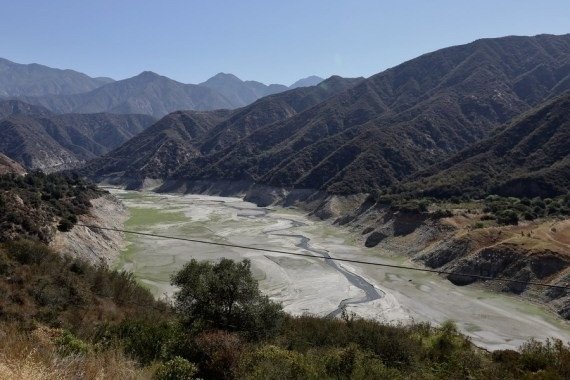America
US imposes new restrictions amid Colorado River drought

Los Angeles, Aug 17
After Colorado River Basin states failed to meet a deadline for emergency drought reductions, the US Bureau of Reclamation said it would continue to work with affected states and tribes to reach an agreement.
The seven states have been told to develop plans to drastically reduce water use by 2 million to 4 million acre-feet, but talks have grown acrimonious. At a press conference on Tuesday, federal officials said that an agreement was urgently needed and that it was also declaring a tier 2 shortage for the next water year, dpa news agency reported.
"In order to avoid a catastrophic collapse of the Colorado River System and a future of uncertainty and conflict, water use in the Basin must be reduced," said Tanya Trujillo, the Interior Department's assistant secretary for water and science.
Under tier 2 shortage conditions, Arizona's annual water apportionment will be reduce by 21 per cent, Nevada's by 8 per cent and Mexico's by 7 per cent. There is no required water savings contribution for California however.
"The risks that we see to the system is based on the best available science that we've seen - and those risks have not changed, so today we're starting the process and more information will follow as far as the actions we'll take in that process," said Bureau of Reclamation Commissioner Camille Calimlim Touton.
The absence of an agreement among the states now raises the risk that the Colorado River crisis - brought on by chronic overuse and the West's drying climate - could spiral into a legal morass. At the same time, Interior Department officials have warned they are prepared to impose cuts if necessary to protect reservoir levels.
When asked by reporters that if the federal government impose such, Touton said, "I want to continue to push on the need for partnership in the basin and the need for collaboration and finding a consensus solution, not just for next year, but for the future."
Those involved in the negotiations say there have been difficult discussions among the states, and among urban and agricultural water districts. There have also been growing tensions between the states of the river's Lower Basin - California, Arizona and Nevada - and those of the Upper Basin - Colorado, Wyoming, New Mexico and Utah.
"The Interior Department will continue, as Commissioner Touton said, working with the basin states to develop consensus solution," Deputy Secretary of the Interior Tommy Beaudreau told reporters.
"There's still time for that. That said, we stand firm in the need to protect the system ... As dire as the situation is, there are reasons for encouragement. First of all, while there remains work to be done, the states have come together to try to hammer out voluntary solutions. This is a complex environment," he added.

9 hours ago
China's escalating war on Christianity deepens with mass arrest of Zion church leaders

10 hours ago
India reopens tourist visa for Chinese citizens after 5-year freeze

14 hours ago
Tejas crashes at Dubai Air Show: IAF regrets ‘loss of life’

14 hours ago
Donald Trump Jr. on three-day Udaipur visit from today

16 hours ago
Delbar Arya shares how shooting for ‘Jadon Da Mobile Aagya’ took her back to her college days

16 hours ago
Sonali Bendre condemns SC’s order to remove stray dogs from public places

16 hours ago
Sayantani Ghosh stresses on the importance of television, its reach on World Television Day

16 hours ago
Arya Babbar looks back at his parents Raj Babbar and Nadiya’s love story on their 50th anniversary

16 hours ago
On World Television Day, Amandeep Sidhu reflects on how TV shaped her life beyond acting

16 hours ago
Parineeti Chopra thanks Priyanka Chopra, Nick Jonas & 'Malti Didi' for showering her baby with gifts

16 hours ago
Kareena Kapoor gets cute hug from son Taimur after returning from school

16 hours ago
Kerala HC moots statewide alert system to trace missing persons

16 hours ago
23-year chase ends as Delhi Police cracks 2002 Sarita Vihar double murder case; two fugitives arrested






















